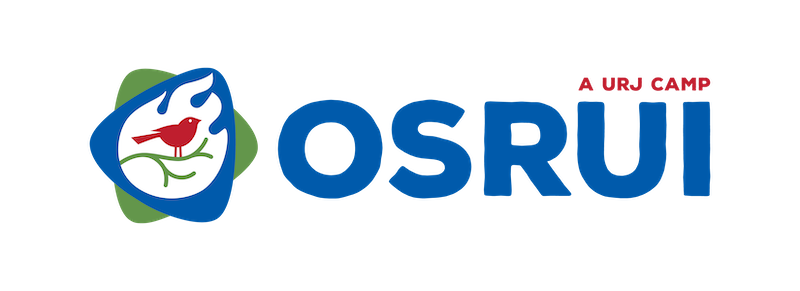by Rabbi Debbie Helbraun and Rabbi Scott Gellman, Gesher Segel (Faculty)

It’s obvious why a Jewish kid from an active family belonging to a URJ synagogue winds up at OSRUI for summer camp. It is not obvious to many of our kids, however, how they will formulate, express, and maintain Judaism as they grow towards independence and begin to shape the values and traditions that they will live by. Here are 10 ideasthat our chanichim (campers) contemplated during their time at OSRUI.
10. Eating can be a mindful activity
Keeping kosher, knowing where your food came from, saying a prayer to thank God for the raw materials that come from our Earth. This is what separates human beings, that we can be mindful and thankful and not just gluttonous because we are hungry.
9. Prayer can have a powerful impact on the way a person experiences things

Every experience can be a prayerful moment–you do not need to be in the synagogue to pray, to wonder, to contemplate, to assess.
8. Something that is worn can change someone’s attitude
Donning a kippah or a tallit can be a reminder to act a certain way, to maintain a particular mood, or to bring one’s mind towards thoughtful meditation, cheerful thankfulness, or humble requests.
7. Social Justice work is not just a good thing to do, it is what Jewish people do
From a letter writing campaign to picking up trash, doing acts of Tikkun Olam (repairing the world) permeates life at OSRUI. We recall that “we too were slaves in Egypt” and that we have a Jewish responsibility to help those who suffer. From Moses and Esther to Justice Ruth Bader Ginsburg and Rabbi Abraham Joshua Heschel, we have been a people who hold dear the responsibility to make our world a better place. To be a social justice warrior is not just a good deed, it is a mitzvah, a commandment, which we are all bound by.
6. Israel and Hebrew are living embodiments of our people
Hebrew connects us to every other Jew in the world and reaches down through history to our ancestors. At camp you might find yourself walking down Derech Rabin (Rabin way) to go to your Tochnit Erev (evening program) where your Israeli madrich (counselor) leads your eidah (unit) in Erev Tzahal (Israeli Army Night). A love for—and a meaningful connection with—Israel is baked right into camp life.
5. Judaism can be a catchy beat, a fun song, a lively dance
 The group went wild when they heard the opening notes to an Israeli dance, immediately placed themselves into lines and became lost in the moment. During Shabbat Shira, the giant all-camp song session, chanichim join in orchestrated claps, gestures, and intonations handed down from madrich to chanich for generations in a way in which something quite foreign to the outside world seems like the most natural thing to do.
The group went wild when they heard the opening notes to an Israeli dance, immediately placed themselves into lines and became lost in the moment. During Shabbat Shira, the giant all-camp song session, chanichim join in orchestrated claps, gestures, and intonations handed down from madrich to chanich for generations in a way in which something quite foreign to the outside world seems like the most natural thing to do.
4. We are a Kehillah Kedoshah
Divisions among people are superficial. Everyone is made in the image of God. When we bring together holy people to do the holy work of learning, discussions, playing sports, eating together, working together, and comforting each other we are forming a Kehillah Kedoshah (holy community).
3. Tefillah on a basketball court
Prayer does not only happen with a siddur (prayer book) in hand, prayer does not only happen in a sanctuary. Any space can be made holy through prayer. You can even learn about the Nissim b’Chol Yom, the Daily Miracles, through a special game of basketball where you come to appreciate the blessings you have in your life!
2. Looking out at a lake, or a tree, or a bug on the ground
 Rabbi Abraham Joshua Heschel wrote “Our goal should be to live life in radical amazement. ….get up in the morning and look at the world in a way that takes nothing for granted. Everything is phenomenal; everything is incredible; never treat life casually. To be spiritual is to be amazed.” To ‘Live Judaism’ at camp means just this, to never treat life casually, to appreciate all that our world has to offer and to look out for those ‘Shecheheyanu Moments’.
Rabbi Abraham Joshua Heschel wrote “Our goal should be to live life in radical amazement. ….get up in the morning and look at the world in a way that takes nothing for granted. Everything is phenomenal; everything is incredible; never treat life casually. To be spiritual is to be amazed.” To ‘Live Judaism’ at camp means just this, to never treat life casually, to appreciate all that our world has to offer and to look out for those ‘Shecheheyanu Moments’.
1. Jewish living is catchy
When your child comes back from camp singing new songs, wanting to pray before or after meals, or using Hebrew words that you do not understand, embrace their enthusiasm. Nurture it. Extend upon it. This is the future. Become a part of it all.
Rabbi Debbie Helbraun serves as Hebrew School Principal at Temple Jeremiah in Northfield, IL. Rabbi Scott Gellman serves as Assistant Rabbi at Temple Sholom in Chicago, IL.
